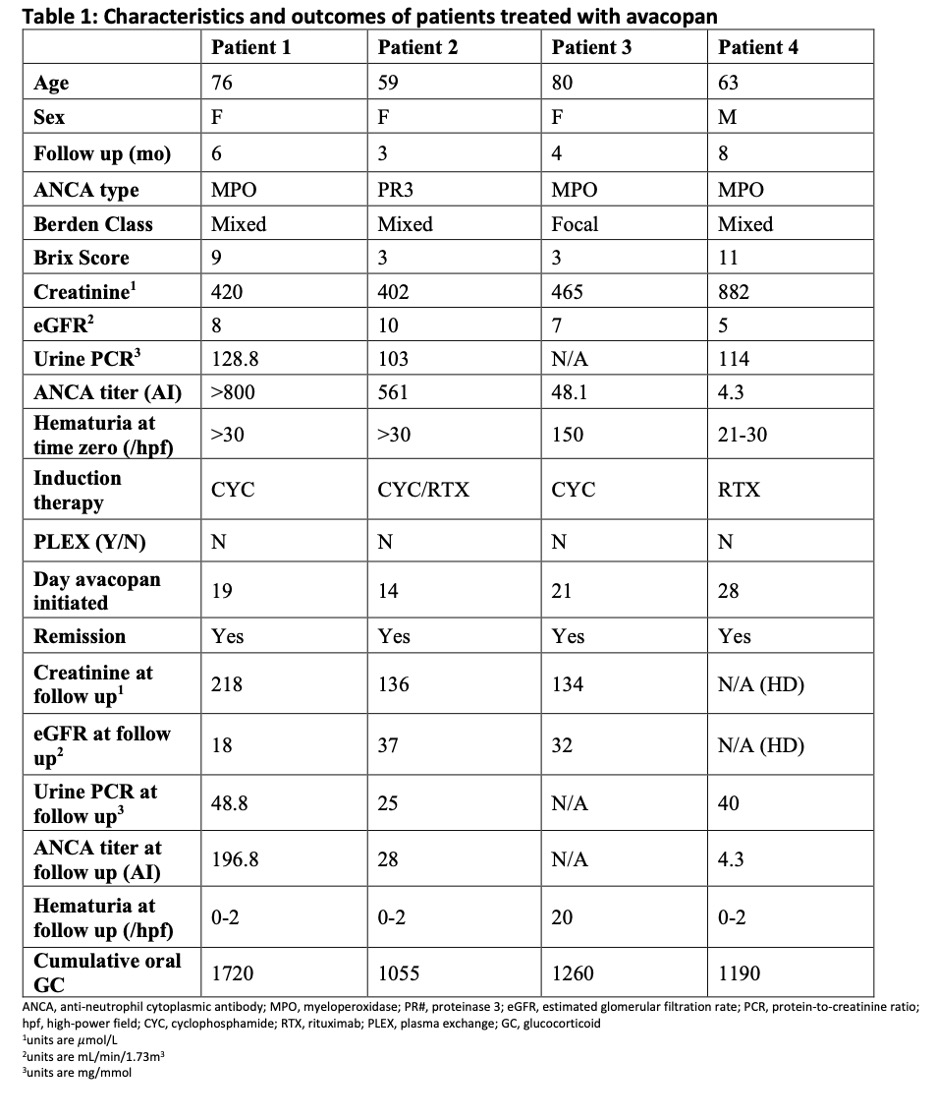Session Information
Date: Sunday, November 12, 2023
Title: (0673–0690) Vasculitis – ANCA-Associated Poster I: Treatment Outcomes
Session Type: Poster Session A
Session Time: 9:00AM-11:00AM
Background/Purpose: Glomerulonephritis represents a severe manifestation of anti-neutrophil cytoplasmic antibody (ANCA) associated vasculitis (AAV) and is associated with substantial morbidity and mortality. Therefore, maximal recovery of kidney function is imperative to improve long-term survival and quality of life. Patients who require kidney replacement therapy (KRT) have the worst long-term outcomes with kidney function following six months of therapy being predictive of future requirement of KRT. Despite advances in induction therapy, there remains a substantial reliance on glucocorticoids, resulting in significant treatment-associated morbidity. Avacopan, a small molecule C5a receptor antagonist, was recently demonstrated to be superior to prednisone with respect to sustained remission at 52 weeks and reduced glucocorticoid toxicity. Avacopan has also been shown to improve estimated glomerular filtration rate (eGFR) compared to prednisone, particularly in the subset of patients with eGFR < 20 mL/min/1.73m2. However, patients with eGFR < 15 mL/min/1.73m2 were excluded from the clinical trials. Our objective was to describe the experience of patients at our centre with AAV who presented with eGFR < 15 mL/min/1.73m2.
Methods: This was a retrospective case series of four patients with AAV and an eGFR < 15 mL/min/1.73m2, treated with avacopan at the University of Calgary, Calgary, Canada between November 2022 and May 2023.
Results: Four patients with AAV presenting with an eGFR < 15 mL/min/1.73m2 were treated at our centre. Their clinical characteristics, management and outcomes are detailed in Table 1. The patients ranged in age from 59-80. Two patients had GPA and one was PR3 positive. All four had an eGFR < 15 (range 5-10 mL/min/1.73m2) at presentation and a renal biopsy documenting glomerulonephritis. Two received cyclophosphamide as induction, one a combination of rituximab and cyclophosphamide and one rituximab. All four patients were in remission at last follow-up with one patient dialysis dependent. For the patient dialysis dependent, avacopan was stopped at three months. Cumulative steroid exposure ranged from 1 to 1.7 grams of prednisone or prednisone equivalent. There were no treatment related adverse events or serious infections.
Conclusion: In conclusion, we present four cases describing the use of avacopan in individuals with AAV and eGFR < 15 mL/min/1.73m2 at presentation. Avacopan appeared to be safe, with reduced glucocorticoid exposure in all patients, and resulted in substantial eGFR recovery in three individuals. More study is required to understand the short- and long-term impacts of avacopan on kidney function in this subgroup of AAV patients.
To cite this abstract in AMA style:
Barr B, Cheema K, Fifi-Mah A, Garner S, Girard L, Ma J. Use of Avacopan in Patients with ANCA-associated Vasculitis and Estimated Glomerular Filtration Rate < 15 mL/min/1.73m2 [abstract]. Arthritis Rheumatol. 2023; 75 (suppl 9). https://acrabstracts.org/abstract/use-of-avacopan-in-patients-with-anca-associated-vasculitis-and-estimated-glomerular-filtration-rate-15-ml-min-1-73m2/. Accessed .« Back to ACR Convergence 2023
ACR Meeting Abstracts - https://acrabstracts.org/abstract/use-of-avacopan-in-patients-with-anca-associated-vasculitis-and-estimated-glomerular-filtration-rate-15-ml-min-1-73m2/

